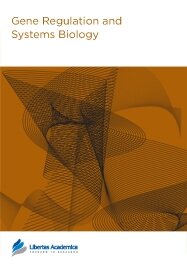

Publication Date: 21 Jul 2009
Type: Original Research
Journal: Gene Regulation and Systems Biology

SG2NA is a member of the striatin protein family. In human and mouse, the SG2NA gene encodes two major protein isoforms: SG2NAα and SG2NAβ. The functions of these proteins, except for acting as the regulatory subunits for PP-2A, remain largely unknown. To explore the possible functions of SG2NA in lower vertebrates, we have isolated two SG2NA cDNAs from goldfish, Carassius auratus. Our results reveal that the first cDNA contains an ORF of 2118 bp encoding a deduced protein with 705 amino acids, and the second one 2148 bp coding for a deduced protein of 715 amino acids. Comparative analysis reveals that both isoforms belong to the α-type, and are named SG2NAα and SG2NAα+. RT-PCR and western blot analysis reveal that the SG2NA gene is differentially expressed in 9 tissues examined. During goldfish development, while the SG2NA mRNAs remain relatively constant in the first 3 stages and then become decreased and fluctuated from gastrula to larval hatching, the SG2NA proteins are fluctuated, displaying a peak every 3 to 4 stages. Each later peak is higher than the earlier one and the protein expression level becomes maximal at hatching stage. Together, our results reveal that SG2NA may play an important role during goldfish development and also in homeostasis of most adult tissues.
PDF (8.10 MB PDF FORMAT)
RIS citation (ENDNOTE, REFERENCE MANAGER, PROCITE, REFWORKS)
BibTex citation (BIBDESK, LATEX)
XML
PMC HTML
The reviewing and editorial management of our paper was timely, thorough, and systematic. In particular the reviewers' comments resulted in a paper significantly more robust than the first version.

All authors are surveyed after their articles are published. Authors are asked to rate their experience in a variety of areas, and their responses help us to monitor our performance. Presented here are their responses in some key areas. No 'poor' or 'very poor' responses were received; these are represented in the 'other' category.See Our Results
Copyright © 2013 Libertas Academica Ltd (except open access articles and accompanying metadata and supplementary files.)
FacebookGoogle+Twitter
PinterestTumblrYouTube